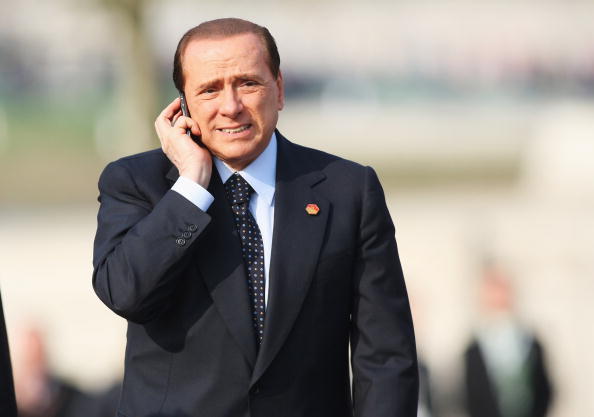Silvio Berlusconi: Ex Italian PM known for sex-fuelled parties, dogged by corruption and scandal, dies aged 86

Former Italian premier and media mogul Silvio Berlusconi has died at the age of 86, Italian media has reported.
He was Italy’s longest-serving premier despite scandals over his sex-fuelled parties and allegations of corruption.
Italian news agency LaPresse reported Mr Berlusconi’s death after he was taken to hospital on Friday for the second time in months to be treated for chronic leukaemia.
Mr Berlusconi had previously been taken to hospital in Milan on April 5 with a lung infection stemming from the disease, said Dr Alberto Zangrillo, his personal physician.
He had suffered over the years from heart ailments and prostate cancer, and was also taken to hospital after a Covid-19 infection in 2020.
A one-time cruise ship crooner, Berlusconi used his television networks and immense wealth to launch his long political career, inspiring both loyalty and loathing.
To admirers, the three-time premier was a capable and charismatic statesman who sought to elevate Italy on the world stage.
To critics, he was a populist who threatened to undermine democracy by wielding political power as a tool to enrich himself and his businesses.
His Forza Italia political party was a coalition partner with current Premier Giorgia Meloni, a far-right leader who came to power last year, although he held no position in the government.
Mr Berlusconi was remembered by Ms Meloni as “above all as a fighter”.
“He was a man who had never been afraid to defend his beliefs. And it was exactly that courage and determination that made him one of the most influential men in the history of Italy,” she said on Italian TV.
His friendship with Russian President Vladimir Putin put him at odds with Ms Meloni, a staunch supporter of Ukraine.
On his 86th birthday, while the war raged, Mr Putin sent Mr Berlusconi best wishes and vodka, and the Italian boasted he returned the favour by sending back Italian wine.
As Mr Berlusconi aged, some derided his perpetual tan, hair transplants and live-in girlfriends who were decades younger. For many years, however, Mr Berlusconi seemed untouchable despite the personal scandals.
Criminal cases were launched but ended in dismissals when statutes of limitations ran out in Italy’s slow-moving justice system, or he was victorious on appeal.
Investigations targeted the tycoon’s steamy so-called “bunga bunga” parties involving young women and minors, or his businesses, which included the football team AC Milan, the country’s three biggest private TV networks, magazines and a daily newspaper, and advertising and film companies.
Only one probe led to a conviction – a tax fraud case stemming from a sale of movie rights in his business empire.
The conviction was upheld in 2013 by Italy’s top criminal court, but he was spared prison because of his age, 76, and was ordered to do community service by assisting Alzheimer’s patients.
He still was stripped of his senate seat and banned from running or holding public office for six years, under anti-corruption laws.
Mr Berlusconi stayed at the helm of Forza Italia, the centre-right party he created when he entered politics in the 1990s and named after a football chant: “Let’s go, Italy.”
With no groomed successor in sight, voters started to desert it.
He eventually held office again – elected to the European Parliament at the age of 82 and then last year to the Italian senate.
Mr Berlusconi’s party was eclipsed as the dominant force on Italy’s political right: first by the League, led by anti-migrant populist Matteo Salvini, then by Ms Meloni’s Brothers of Italy party, with its roots in neo-fascism.
Following elections in 2022, Ms Meloni formed a governing coalition with Forza’s help.
He suffered personal humiliations as well. Mr Berlusconi lost his standing as Italy’s richest man, although his sprawling media holdings and luxury property still left him a billionaire several times over.
In 2013, guests at one of his parties included an under-age Moroccan dancer whom prosecutors alleged had sex with Mr Berlusconi in exchange for cash and jewellery.
After a trial spiced by lurid details, a Milan court initially convicted Mr Berlusconi of paying for sex with a minor and using his office to try to cover it up. Both denied having sex with each other, and he was eventually acquitted.
The Catholic Church, at times sympathetic to his conservative politics, was scandalised by his antics, and his wife of nearly 20 years divorced him. But Mr Berlusconi was unapologetic, declaring: “I’m no saint.”
Mr Berlusconi insisted that voters were impressed by his brashness.
“The majority of Italians in their hearts would like to be like me and see themselves in me and in how I behave,” he said in 2009, during his third and final stint as premier.
He boasted of his libido and entertained friends and world leaders at his villas. At one party, newspapers reported the women were dressed as “little Santas”. At another, photos showed topless women and a naked man lounging poolside.
An unrepentant Mr Berlusconi said in 2010: “I love life! I love women!”
Former premier Matteo Renzi recalled Mr Berlusconi’s divisive legacy in a message on Twitter.
He wrote: “Silvio Berlusconi made history in this country. Many loved him, many hated him. All must recognise that his impact on political life, but also economic, sport and television, has been without precedence.”
League party leader Matteo Salvini called Mr Berlusconi “a great man and a great Italian”.
Press Asspcoatopm – Frances D’Emilio, AP
